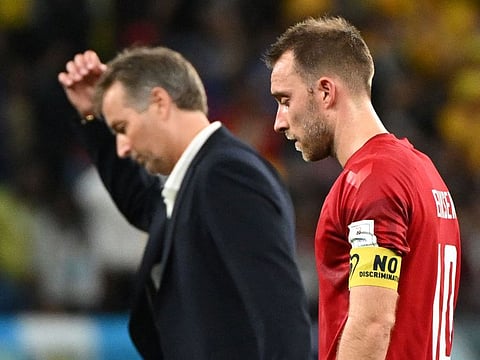Qatar World Cup: There’s no fairytale ending for Christian Eriksen and Denmark
From the highs of Euro 2020, Denmark crash out of World Cup 2022 with a flop show

Denmark are going home. Shed no tears for Kasper Hjulmand’s team, for they didn’t deserve a place in the Round of 16. No wins and one goal in three games: the pathetic record reflects their insipid displays in Qatar.
Take the game against Australia. It was their final Group D tie. A match Denmark had to win to stay alive in the tournament. Never mind that it wouldn’t have mattered since Tunisia went on to stun defending champions France, which altered the equation. But at the start, it was clear that Denmark had to win at all costs.
That urgency was evident in the early phase when the Danes applied so much pressure that Australia were at risk of conceding a goal. Denmark went close several times, but a goal didn’t materialise. It amply sums up the Danish failure and frustration at the World Cup.
A shortage of goals undermined the Danes. Goals win matches, and the Danes had one from three games. It points to the absence of a quality striker. The lone goal was scored by a defender: Andreas Christiansen.
Hjulmand should take the blame for it. How can a coach go into the World Cup without dependable strikers? He must have been misled by the 20 goals scored by the Danes in the World Cup qualifiers. Many of them were played at home, where crowd support helps players perform at a higher level. There weren’t too many Danish supporters in Qatar, and that’s hardly a reason for such a lacklustre show.
Denmark’s poor marksmanship
The Danes were aware of their poor marksmanship. Martin Braithwaite, who carried the attack against Australia at the Al Janoub Stadium, was the third striker deployed by Hjulmand in three matches. It clearly shows the coach’s lack of confidence in his forwards. It reflected in his tactics too, opting for a three-man defence when four at the back would have helped in the attack.
Some factors were beyond Hjulmand’s control. Injury deprived the services of Simon Kjaer, and Christian Eriksen wasn’t at his best. These hurt the Danes as they couldn’t slice through the rival defences.
But how did they make the Euro semifinals? Much of that should be attributed to Eriksen’s hospitalisation after a cardiac arrest during the match against Finland at the Parken Stadium in Copenhagen. Spurred by a desire to win for their stricken talisman, the Danes hit a purple patch before being lanced down in the last four.
That run of success inevitably sowed the seeds of failure in Qatar. Their buoyant displays in the qualifiers added to expectations at the World Cup. Expectations that weighed the team down.
How Eriksen revived his career
Eriksen returned to top-flight football with an implanted cardioverter-defibrillator (a pacemaker) and revived his career with a spell at Brentford before moving to Manchester United. He seemed to be returning to his best as he ran the United midfield in the Premier League and helped Denmark qualify for the World Cup. He couldn’t script a fairytale ending in Qatar.
As the Danes fly home, they would wistfully look back at 1998, when the Laudrup brothers, Michael and Brian, took them to the quarterfinals in France. They never made it that far again, although Denmark are regulars at the World Cup. We might see them in four years.
Hej hej, vi ses i Amerika! (Bye, see you in America)
Sign up for the Daily Briefing
Get the latest news and updates straight to your inbox




